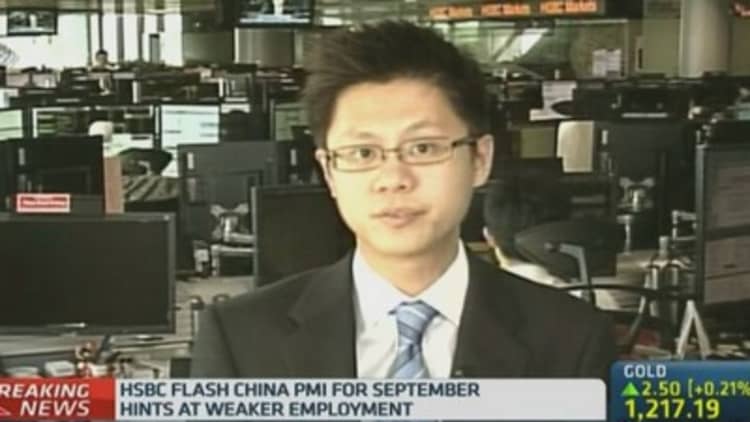
China's manufacturing activity unexpectedly picked up pace in September on strong orders, a private survey showed on Tuesday, but the optimism was offset by factory employment which slumped to a five-and-a-half year low.
The HSBC flash manufacturing Purchasing Managers' Index (PMI) rose to 50.5 from a final reading of 50.2 in August, better than expectations for a reading of 50, which separates expansion from contraction.
The Australian dollar initially rose 0.2 percent against the U.S. dollar on the news, but gave up the gains soon after. Asian stocks were mixed with the Shanghai Composite outperforming the region, up 0.8 percent.
Read MoreAsia stocks higher after upbeat China PMI
"This is an improvement compared to what markets are expecting [but] If we just look at recent numbers, this is just hovering at 50. So the bigger picture shows that it is growing but only marginally and very slow compared to past standards," John Zhu, Greater China economist at HSBC, told CNBC following the data.
Markets have become increasingly jittery over the performance of China's economy after a disappointing showing in recent months. Industrial production growth in August slowed to its lowest level since the 2008 global financial crisis, while its economically vital property market slid for a fourth straight month.
The PMI sub-indexes also uncovered worrying signs about the job market. A measure of employment shed more than a point, dropping to 46.9 - its lowest since February 2009 when a collapse in exports threw tens of millions of Chinese out of work.
This could raise alarm bells for the Chinese government, which has indicated it will tolerate slower economic growth as long as employment is not affected.
Read MoreWhy Chinese money is flooding American markets
"It is in line with what we've been saying - the recovery we are seeing now is slow and uneven and that is slightly bad for pricing power for producers and if that continues, jobs may be cut," said Zhu. "So on the whole, economy is doing okay but not to the extent where it's moving to a higher gear where firms feel comfortable to add to payrolls."
But the employment index aside, other measures in the PMI poll fared better. Total new orders rose, and new export orders also climbed to their highest level since March 2010.The overall output level remained flat on the month, while output prices fell to a six-month low.
Policymakers have remained sanguine about China's economy; Premier Li Keqiang said during the recent World Economic Forum in Tianjin, China, that the economy will avoid a hard landing, noting that the government has a full range of policy tools at its disposal.
There has been speculation that Beijing may embark on more aggressive easing measures to battle the economic slowdown,but the government has stuck to a script of targeted stimulus for now – the most recent came last week when the People's Bank of China provided liquidity injections worth $81 billion for its five largest lenders.
Read MoreBillionaires are hoarding mountains of cash
"I think the message coming out is [policymakers] won't come with a big policy package or a growth bazooka. They will take small targeted steps to get growth closer to their target while trying to keep a lid on financial rebalances and property," said Nick Kounis, head of macro research at ABN AMRO.
According to HSBC's Zhu,the economy currently does need more accommodative policies as it's still growing, albeit in "second-gear."
"While the [targeted measures] are slightly less ideal, let's not forget we are not yet in contractionary territory. We are just trying to smooth temporary weakness so the big guns like interest rate and RRR [reserve requirement ratio] cuts are still there but we don't think the data warrant that," he said.
China's economy grew 7.5 percent in the second quarter after expanding 7.4 percent in the first quarter, it's slowest rate in six quarters. Beijing has set 2014 growth target at 7.5 percent.
The final HSBC/Markit manufacturing PMI for the month is due on Sept. 30, while the official reading will be released on October 1. The HSBC surveys tend to cover small to medium-sized companies, which are believed to be under far more stress than larger, state-owned firms which the official report broadly focuses on.

